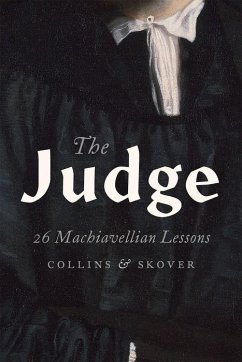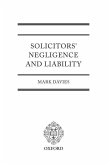Schade – dieser Artikel ist leider ausverkauft. Sobald wir wissen, ob und wann der Artikel wieder verfügbar ist, informieren wir Sie an dieser Stelle.
- Gebundenes Buch
- Merkliste
- Auf die Merkliste
- Bewerten Bewerten
- Teilen
- Produkt teilen
- Produkterinnerung
- Produkterinnerung
Using Machiavelli's The Prince as its model, Ronald K.L. Collins and David M. Skover's The Judge offers judges advice on how to be effective political actors.
Andere Kunden interessierten sich auch für
![Character Character]() Deborah L RhodeCharacter34,99 €
Deborah L RhodeCharacter34,99 €![Informed Consent Informed Consent]() Jessica W BergInformed Consent114,99 €
Jessica W BergInformed Consent114,99 €![Ambition Ambition]() Deborah L RhodeAmbition39,99 €
Deborah L RhodeAmbition39,99 €![Permit But Discourage Permit But Discourage]() W a BogartPermit But Discourage173,99 €
W a BogartPermit But Discourage173,99 €![Solicitor's Negligence and Liablility Solicitor's Negligence and Liablility]() Mark DaviesSolicitor's Negligence and Liablility303,99 €
Mark DaviesSolicitor's Negligence and Liablility303,99 €![Judge and Jurist in the Reign of Victoria Judge and Jurist in the Reign of Victoria]() Judge and Jurist in the Reign of Victoria42,99 €
Judge and Jurist in the Reign of Victoria42,99 €
Using Machiavelli's The Prince as its model, Ronald K.L. Collins and David M. Skover's The Judge offers judges advice on how to be effective political actors.
Produktdetails
- Produktdetails
- Verlag: Hurst & Co.
- Seitenzahl: 296
- Erscheinungstermin: 3. Oktober 2017
- Englisch
- Abmessung: 218mm x 149mm x 29mm
- Gewicht: 420g
- ISBN-13: 9780190490140
- ISBN-10: 0190490144
- Artikelnr.: 48064943
- Herstellerkennzeichnung
- Libri GmbH
- Europaallee 1
- 36244 Bad Hersfeld
- gpsr@libri.de
- Verlag: Hurst & Co.
- Seitenzahl: 296
- Erscheinungstermin: 3. Oktober 2017
- Englisch
- Abmessung: 218mm x 149mm x 29mm
- Gewicht: 420g
- ISBN-13: 9780190490140
- ISBN-10: 0190490144
- Artikelnr.: 48064943
- Herstellerkennzeichnung
- Libri GmbH
- Europaallee 1
- 36244 Bad Hersfeld
- gpsr@libri.de
Ronald K.L. Collins is Harold S. Shefelman Scholar, University of Washington School of Law. David M. Skover is Fredric C. Tausend Professor of Law, Seattle University School of Law
Prologue
1. The Confirmation Process and the Virtues of Duplicity
2. How to be Aggressive and Passive . . . and Great
3. Recusal and the Vices of Impartiality
4. The Use and Misuse of the Politics of Personality
5. Fortuna: The Role of Chance in Choosing Cases
6. When and Why to Avoid a Case
7. Carpe Diem: When to Embrace Controversy
8. Tactical Tools: Using Procedure to One's Advantage
9. Oral Arguments: What to Say and How
10. When to Lose a Case and Win a Cause
11. In Defense of Unprincipled Decisionmaking
12. How to Manipulate the Rule of Law
13. When Precedents Are to Be Honored (If Only Formally)
14. When to Take Command and Make Demands
15. The Boldest Moves: When and How to Make Them
16. On Writing: When Style Should Trump Substance
17. When It Is Wise to Write a Separate Opinion
18. Law Clerks: When and How to Use Them
19. How to Befriend Those in the Media
20. Cameras in the Courtroom: Seizing the Future
21. On Television: The Medium Is Not the Message
22. On Publishing Books: When and of What Kind
23. The Threat of Impeachment and How Best to Avoid It
24. When It Is Best to Retire
25. Directing History: A Justice's Working Papers and What to Do with Them
26. How to Best Secure an Enduring Legacy
Epilogue
Acknowledgements
About the Authors
Notes
Index
1. The Confirmation Process and the Virtues of Duplicity
2. How to be Aggressive and Passive . . . and Great
3. Recusal and the Vices of Impartiality
4. The Use and Misuse of the Politics of Personality
5. Fortuna: The Role of Chance in Choosing Cases
6. When and Why to Avoid a Case
7. Carpe Diem: When to Embrace Controversy
8. Tactical Tools: Using Procedure to One's Advantage
9. Oral Arguments: What to Say and How
10. When to Lose a Case and Win a Cause
11. In Defense of Unprincipled Decisionmaking
12. How to Manipulate the Rule of Law
13. When Precedents Are to Be Honored (If Only Formally)
14. When to Take Command and Make Demands
15. The Boldest Moves: When and How to Make Them
16. On Writing: When Style Should Trump Substance
17. When It Is Wise to Write a Separate Opinion
18. Law Clerks: When and How to Use Them
19. How to Befriend Those in the Media
20. Cameras in the Courtroom: Seizing the Future
21. On Television: The Medium Is Not the Message
22. On Publishing Books: When and of What Kind
23. The Threat of Impeachment and How Best to Avoid It
24. When It Is Best to Retire
25. Directing History: A Justice's Working Papers and What to Do with Them
26. How to Best Secure an Enduring Legacy
Epilogue
Acknowledgements
About the Authors
Notes
Index
Prologue
1. The Confirmation Process and the Virtues of Duplicity
2. How to be Aggressive and Passive . . . and Great
3. Recusal and the Vices of Impartiality
4. The Use and Misuse of the Politics of Personality
5. Fortuna: The Role of Chance in Choosing Cases
6. When and Why to Avoid a Case
7. Carpe Diem: When to Embrace Controversy
8. Tactical Tools: Using Procedure to One's Advantage
9. Oral Arguments: What to Say and How
10. When to Lose a Case and Win a Cause
11. In Defense of Unprincipled Decisionmaking
12. How to Manipulate the Rule of Law
13. When Precedents Are to Be Honored (If Only Formally)
14. When to Take Command and Make Demands
15. The Boldest Moves: When and How to Make Them
16. On Writing: When Style Should Trump Substance
17. When It Is Wise to Write a Separate Opinion
18. Law Clerks: When and How to Use Them
19. How to Befriend Those in the Media
20. Cameras in the Courtroom: Seizing the Future
21. On Television: The Medium Is Not the Message
22. On Publishing Books: When and of What Kind
23. The Threat of Impeachment and How Best to Avoid It
24. When It Is Best to Retire
25. Directing History: A Justice's Working Papers and What to Do with Them
26. How to Best Secure an Enduring Legacy
Epilogue
Acknowledgements
About the Authors
Notes
Index
1. The Confirmation Process and the Virtues of Duplicity
2. How to be Aggressive and Passive . . . and Great
3. Recusal and the Vices of Impartiality
4. The Use and Misuse of the Politics of Personality
5. Fortuna: The Role of Chance in Choosing Cases
6. When and Why to Avoid a Case
7. Carpe Diem: When to Embrace Controversy
8. Tactical Tools: Using Procedure to One's Advantage
9. Oral Arguments: What to Say and How
10. When to Lose a Case and Win a Cause
11. In Defense of Unprincipled Decisionmaking
12. How to Manipulate the Rule of Law
13. When Precedents Are to Be Honored (If Only Formally)
14. When to Take Command and Make Demands
15. The Boldest Moves: When and How to Make Them
16. On Writing: When Style Should Trump Substance
17. When It Is Wise to Write a Separate Opinion
18. Law Clerks: When and How to Use Them
19. How to Befriend Those in the Media
20. Cameras in the Courtroom: Seizing the Future
21. On Television: The Medium Is Not the Message
22. On Publishing Books: When and of What Kind
23. The Threat of Impeachment and How Best to Avoid It
24. When It Is Best to Retire
25. Directing History: A Justice's Working Papers and What to Do with Them
26. How to Best Secure an Enduring Legacy
Epilogue
Acknowledgements
About the Authors
Notes
Index







